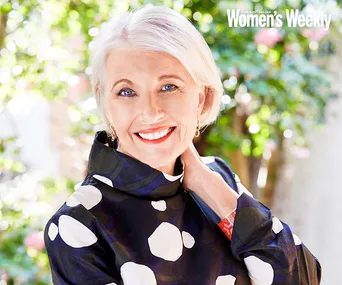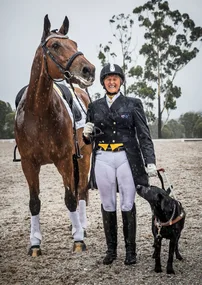For Jonathan Coleman, Friday June 23, 2017 began as a day like any other. That morning he was up before sunrise and off to the Ultimo studios of Network 10 to make kitchenware seem uproariously entertaining on the set of Studio 10. He was thinking about the farewell lunch that was planned for a colleague and later he’d be at 2UE for his regular radio job. Then life came crashing in, as it does.
You’re not going to find a more relentlessly upbeat person than Jono Coleman. When The Women’s Weekly team visits on a crisp spring morning, his wife Margot Fitzpatrick is making tea and Jono is looking across Rushcutters’ Bay Park, pondering the politics and rituals of the local dog owners.
“When I go out with Banjo [his caramel cavoodle], I’m like a 70-year old,” he says with a smile. “Every so often I’ve got to sit down and have a rest.”
Jono has just completed 18 weeks of chemotherapy, followed by seven weeks of radiotherapy for prostate cancer, but unless you were spying on his daily dog walk, you wouldn’t guess it. In fact, Jono doesn’t seem to change at all.
He still has that naughty-boy look that we remember from his days as a cub reporter on Simon Townsend’s Wonder World; his face is still unlined; his hair as bushy as beachside scrub.
Last June, shortly after finishing at Studio 10, Jono visited his GP where the results of a recent blood test suggested a problem. The PSA (Prostate-Specific Antigen) reading should have come in at one or less, but Jono’s was seven. Within a couple of hours, he was at St. Vincent’s Hospital in Sydney in the office of Professor Phillip Stricker, a specialist and world leader in the treatment of prostate cancer. There, the inevitable and slightly embarrassing physical examination took the wind a little further out of his already sagging sails.
“So there I am,” Jono recalls. “It’s Friday afternoon and I’m supposed to be out to lunch. Instead of being up the pub having a few drinks, I have a Philip Stricker with his finger up my bottom.”
It was one of those moments when your life really does flash before your eyes. Jono, then 61, thought about his father who had passed away at the age of 62. He thought about Margot and their kids, and all the luck that had come their way in life, which could be swept off in a moment. He could sense how easy it would be to slip into despair, but he didn’t. Jono gathered himself up and said, “Right, what do we have to do to beat this?”
“He’s a great guy to treat,” says Professor Stricker. “We were behind the eight ball to try and control his fairly advanced cancer but there have been a lot of advances in this area, so we were hopeful. Some people melt down out of fear when they’re diagnosed, and some people use humour to get over it.” Jono unsurprisingly was the latter.
“There was never a moment we fell in a heap and cried our hearts out”, adds Margot. “We were more like, ‘what’s the next step?’ We’re natural fighters.”
“We were probably more scared than he was,” says firstborn Oscar on the reaction that he and his sister, Emily, had. “Dad was ready to do the Dunkirk sprint. I’m more a realist and he’s such an optimist.”
Jono takes on the world
That’s typical of Jono. Irrepresible. A childhood obsession with broadcasting led him to join Wonder World as a TV reporter and he was an instant star. Wonder World led to radio and teaming up with Ian “Dano” Rogerson for groundbreaking shows on Double Jay and then Triple M.
Jono threw caution to the wind in 1990. He and Margot moved to London and started all over again. By the time they returned to Australia after 16 years, Jono Coleman was one of the most respected radio broadcasters in the UK.
It hasn’t all been clear and steady sailing. He’s has had the usual career and personal setbacks but he manages to accentuate the positive.
“I’ve always been like that,” he admits. “Even when I was a kid, going to job interviews, they’d say, ‘We’re not giving you the job this time,’ and I’d say, ‘Cool. When are you advertising again?'”
“This is the most optimistic cancer patient you’ll ever meet,” Margot adds.
The Margot and Jono show is one of the longest running showbusiness marriages. They met at a Wonder World party in 1981 while she was still in her HSC year.
Margot credits the success of their 35-year marriage to a spirit of adventure. “We’ve never stayed doing the same thing,” she explains. “We’ve had different chapters in our lives. In fact, post this cancer treatment, we sold the family home. Both children have left and we find ourselves back in Rushcutters Bay as a couple thinking, life is good and we’re going to enjoy it.”
On June 23, 2017, Margot, who has worked as a producer on award-winning music videos, ads and feature films, was on set making a Toyota commercial and about to fly out to Japan. Margot was the person Jono most wanted to call right then and there at the hospital, but he decided that, “Honey, I just got cancer,” isn’t a conversation to be had over the phone.
“Stricker was like, ‘I can tell you now, you’ve got cancer,'” Jono recalls vividly. “And in my mind I’m thinking, ‘Right, right, when do I tell Margot? What do I do? Do I go to the pub? Do I want to go to the pub? I couldn’t remember if I had to do a radio show that night…”
After gathering his composure, Jono and Professor Stricker got down to the details of combatting the disease. He had only been in the Professor’s surgery for less than an hour. The first step was a biopsy and further scans, which revealed the cancer had spread to Jono’s lymph nodes, some bones and spine. After further consultation, he decided not to have the prostate removed but to go through other therapies.

“And in my mind I’m thinking, ‘Right, right, when do I tell Margot? What do I do? Do I go to the pub? Do I want to go to the pub? I couldn’t remember if I had to do a radio show that night…”
“We decided to do the chemotherapy and hit it with everything,” he says now with satisfaction. An 18-week course of chemotherapy, accompanied by testosterone injections, then radiotherapy, was planned like a military operation.
“The hormone injections bring on ‘manopause’,” Jono explains. “You get hot flushes and put on weight. So I look like this and it’s not just because I’m a fat bastard and I like alcohol. I had to stop eating red meat – anything processed like ham, sausages or pork. Prostate cancer thrives on sugar and alcohol, like breast cancer, so diet was critical.”
Jono reduced his intake of fat and sugar and what was once a glass or two of wine with dinner became a spritzer. Excercise was another key and Banjo was happy for the extra park time.
The chemotherapy sessions were on Fridays and Jono took the weekends to recover, but he was back at work on Mondays. His bosses at the radio and TV stations were supportive and offered all the leave he’d need, but Jono kept up his schedule. “I’d rather do the show and be busy and have fun than sit around,” he says in retrospect. “The show must go on.”
“He doesn’t ever turn off,” says Oscar, who describes his father as a workaholic. “Even when he had cancer, he would pump himself up and go to work and we thought that he was insane.”
Chemotherapy causes hair loss, but Jono wasn’t having any of that. “I told them I was doing Studio 10 every morning and they showed me an English invention, called an ice cap. During chemotherapy, they put this tight swimming cap on your head which has cold water running through it. You get that feeling you have when you eat a really cold ice cream. It’s quite painful and it lasts for a couple of hours. Afterwards, you have icicles in your hair.” Jono was the first man at St Vincent’s to try the ice cap and he kept his luxuriant locks.
Hidden in the genes
Genetic testing revealed that Jono had a BRCA2 gene mutation as a result of his Ashkenazi Jewish ancestry. This mutation is mostly confined to people from parts of Africa, Scandinavia, the Netherlands, Iceland and some European Jews. It can lead to breast and ovarian cancer in women and prostate cancer in men. It was this same test that led to Angelina Jolie’s decision to have a double mastectomy. “Perhaps we’re distantly related,” Jono quips. In times of trouble, he has always fallen back on humour.
“We in the Coleman family have a good sense of humour,” he says. “My parents went through the World War II in London and humour is a way of coping. Oldtime Londoners might say, ‘Well, the weather’s bad today but at least we’re not being bombed by the Luftwaffe.’ I thought: I’ve got cancer but the doctors are saying, at least it’s prostate cancer, and that gave me hope. The thing I learned through all this is that it can be treated.”
The speedy response from the doctors and staff meant that, within six months, they felt they had the better of the cancer. “I’ve been in this business for 30 years,” says Professor Stricker. “When I started, there were only hormone treatments which didn’t work that well and had a lot of side effects. Now we are learning to detect the cancer at an earlier stage. The advances in the last five years have been very significant.
“It’s a two-way street. When we, as clinicians, have more to offer, we create hope in people and the positive attitude comes through. Humour is important with Jono but he’s very well researched too, and he has a good level of trust… It’s hard to predict the future but, to date, he has responded remarkably well and the disease is in remission.”
There have been positive side effects too. “The whole episode has probably brought me closer to Dad,” says Oscar. “We have a better relationship now. We’ve become closer and we chat more about everything in life.”
The “almost all clear” news came only a couple of days before Christmas. “We went straight to a bar and had a champagne,” admits Margot. They have to be vigilant but things are looking up.
“My feeling about cancer,” says Jono, “is take it seriously but don’t freak out. I used to be paranoid about going to the doctor and having blood tests. What are they going to find and how much do you weigh? But now I say, don’t worry about that. Just have the tests. And enjoy life because you never know how much you have left. I have a wife and two kids and I’m working in an industry I love. I’ve been very lucky.”





